- Home
- Leo Tolstoy
The Complete Works of Leo Tolstoy (25+ Works with active table of contents) Page 2
The Complete Works of Leo Tolstoy (25+ Works with active table of contents) Read online
Page 2
But this joyous smile at once recalled everything to him, and he grew thoughtful.
Two childish voices (Stepan Arkadyevitch recognized the voices of Grisha, his youngest boy, and Tanya, his eldest girl) were heard outside the door. They were carrying something, and dropped it.
"I told you not to sit passengers on the roof," said the little girl in English; "there, pick them up!"
"Everything's in confusion," thought Stepan Arkadyevitch; "there are the children running about by themselves." And going to the door, he called them. They threw down the box, that represented a train, and came in to their father.
The little girl, her father's favorite, ran up boldly, embraced him, and hung laughingly on his neck, enjoying as she always did the smell of scent that came from his whiskers. At last the little girl kissed his face, which was flushed from his stooping posture and beaming with tenderness, loosed her hands, and was about to run away again; but her father held her back.
"How is mamma?" he asked, passing his hand over his daughter's smooth, soft little neck. "Good morning," he said, smiling to the boy, who had come up to greet him. He was conscious that he loved the boy less, and always tried to be fair; but the boy felt it, and did not respond with a smile to his father's chilly smile.
"Mamma? She is up," answered the girl.
Stepan Arkadyevitch sighed. "That means that she's not slept again all night," he thought.
"Well, is she cheerful?"
The little girl knew that there was a quarrel between her father and mother, and that her mother could not be cheerful, and that her father must be aware of this, and that he was pretending when he asked about it so lightly. And she blushed for her father. He at once perceived it, and blushed too.
"I don't know," she said. "She did not say we must do our lessons, but she said we were to go for a walk with Miss Hoole to grandmamma's."
"Well, go, Tanya, my darling. Oh, wait a minute, though," he said, still holding her and stroking her soft little hand.
He took off the matelpiece, where he had put it yesterday, a little box of sweets, and gave her two, picking out her favorites, a chocolate and a fondant.
"For Grisha?" said the little girl, pointing to the chocolate.
"Yes, yes." And still stroking her little shoulder, he kissed her on the roots of here hair and neck, and let her go.
"The carriage is ready," said Matvey; "but there's some one to see you with a petition."
"Been here long?" asked Stepan Arkadyevitch.
"Half an hour."
"How many times have I told you to tell me at once?"
"One must let you drink your coffee in peace, at least," said Matvey, in the affectionately gruff tone with which it was impossible to be angry.
"Well, show the person up at once," said Oblonsky, frowning with vexation.
The petitioner, the widow of a staff captain Kalinin, came with a request impossible and unreasonable; but Stepan Arkadyevitch, as he generally did, made her sit down, heard her to the end attentively without interrupting her, and gave her detailed advice as to how and to whom to apply, and even wrote her, in his large, sprawling, good and legible hand, a confident and fluent little note to a personage who might be of use to her. Having got rid of the staff captain's widow, Stepan Arkadyevitch took his hat and stopped to recollect whether he had forgotten anything. It appeared that he had forgotten nothing except what he wanted to forget--his wife.
"Ah, yes!" He bowed his head, and his handsome face assumed a harassed expression. "To go, or not to go!" he said to himself; and an inner voice told him he must not go, that nothing could come of it but falsity; that to amend, to set right their relations was impossible, because it was impossible to make her attractive again and able to inspire love, or to make him an old man, not susceptible to love. Except deceit and lying nothing could come of it now; and deceit and lying were opposed to his nature.
"It must be some time, though: it can't go on like this," he said, trying to give himself courage. He squared his chest, took out a cigarette, took two whiffs at it, flung it into a mother-of-pearl ashtray, and with rapid steps walked through the drawing room, and opened the other door into his wife's bedroom.
Chapter 4
Darya Alexandrovna, in a dressing jacket, and with her now scanty, once luxuriant and beautiful hair fastened up with hairpins on the nape of her neck, with a sunken, thin face and large, startled eyes, which looked prominent from the thinness of her face, was standing among a litter of all sorts of things scattered all over the room, before an open bureau, from which she was taking something. Hearing her husband's steps, she stopped, looking towards the door, and trying assiduously to give her features a severe and contemptuous expression. She felt she was afraid of him, and afraid of the coming interview. She was just attempting to do what she had attempted to do ten times already in these last three days--to sort out the children's things and her own, so as to take them to her mother's--and again she could not bring herself to do this; but now again, as each time before, she kept saying to herself, "that things cannot go on like this, that she must take some step" to punish him, put him to shame, avenge on him some little part at least of the suffering he had caused her. She still continued to tell herself that she should leave him, but she was conscious that this was impossible; it was impossible because she could not get out of the habit of regarding him as her husband and loving him. Besides this, she realized that if even here in her own house she could hardly manage to look after her five children properly, they would be still worse off where she was going with them all. As it was, even in the course of these three days, the youngest was unwell from being given unwholesome soup, and the others had almost gone without their dinner the day before. She was conscious that it was impossible to go away; but, cheating herself, she went on all the same sorting out her things and pretending she was going.
Seeing her husband, she dropped her hands into the drawer of the bureau as though looking for something, and only looked round at him when he had come quite up to her. But her face, to which she tried to give a severe and resolute expression, betrayed bewilderment and suffering.
"Dolly!" he said in a subdued and timid voice. He bent his head towards his shoulder and tried to look pitiful and humble, but for all that he was radiant with freshness and health. In a rapid glance she scanned his figure that beamed with health and freshness. "Yes, he is happy and content!" she thought; "while I.... And that disgusting good nature, which every one likes him for and praises--I hate that good nature of his," she thought. Her mouth stiffened, the muscles of the cheek contracted on the right side of her pale, nervous face.
"What do you want?" she said in a rapid, deep, unnatural voice.
"Dolly!" he repeated, with a quiver in his voice. "Anna is coming today."
"Well, what is that to me? I can't see her!" she cried.
"But you must, really, Dolly..."
"Go away, go away, go away!" she shrieked, not looking at him, as though this shriek were called up by physical pain.
Stepan Arkadyevitch could be calm when he thought of his wife, he could hope that she would come round, as Matvey expressed it, and could quietly go on reading his paper and drinking his coffee; but when he saw her tortured, suffering face, heard the tone of her voice, submissive to fate and full of despair, there was a catch in his breath and a lump in his throat, and his eyes began to shine with tears.
"My God! what have I done? Dolly! For God's sake!.... You know...." He could not go on; there was a sob in his throat.
She shut the bureau with a slam, and glanced at him.
"Dolly, what can I say?.... One thing: forgive...Remember, cannot nine years of my life atone for an instant...."
She dropped her eyes and listened, expecting what he would say, as it were beseeching him in some way or other to make her believe differently.
"--instant of passion?" he said, and would have gone on, but at that word, as at a pang of physical pain, her lips stiffened again, and again the mus
cles of her right cheek worked.
"Go away, go out of the room!" she shrieked still more shrilly, "and don't talk to me of your passion and your loathsomeness."
She tried to go out, but tottered, and clung to the back of a chair to support herself. His face relaxed, his lips swelled, his eyes were swimming with tears.
"Dolly!" he said, sobbing now; "for mercy's sake, think of the children; they are not to blame! I am to blame, and punish me, make me expiate my fault. Anything I can do, I am ready to do anything! I am to blame, no words can express how much I am to blame! But, Dolly, forgive me!"
She sat down. He listened to her hard, heavy breathing, and he was unutterably sorry for her. She tried several times to begin to speak, but could not. He waited.
"You remember the children, Stiva, to play with them; but I remember them, and know that this means their ruin," she said--obviously one of the phrases she had more than once repeated to herself in the course of the last few days.
She had called him "Stiva," and he glanced at her with gratitude, and moved to take her hand, but she drew back from him with aversion.
"I think of the children, and for that reason I would do anything in the world to save them, but I don't myself know how to save them. by taking them away from their father, or by leaving them with a vicious father--yes, a vicious father.... Tell me, after what...has happened, can we live together? Is that possible? Tell me, eh, is it possible?" she repeated, raising her voice, "after my husband, the father of my children, enters into a love affair with his own children's governess?"
"But what could I do? what could I do?" he kept saying in a pitiful voice, not knowing what he was saying, as his head sank lower and lower.
"You are loathsome to me, repulsive!" she shrieked, getting more and more heated. "Your tears mean nothing! You have never loved me; you have neither heart nor honorable feeling! You are hateful to me, disgusting, a stranger--yes, a complete stranger!" With pain and wrath she uttered the word so terrible to herself--stranger.
He looked at her, and the fury expressed in her face alarmed and amazed him. He did not understand how his pity for her exasperated her. She saw in him sympathy for her, but not love. "No, she hates me. She will not forgive me," he thought.
"It is awful! awful!" he said.
At that moment in the next room a child began to cry; probably it had fallen down. Darya Alexandrovna listened, and her face suddenly softened.
She seemed to be pulling herself together for a few seconds, as though she did not know where she was, and what she was doing, and getting up rapidly, she moved towards the door.
"Well, she loves my child," he thought, noticing the change of her face at the child's cry, "my child: how can she hate me?"
"Dolly, one word more," he said, following her.
"If you come near me, I will call in the servants, the children! They may all know you are a scoundrel! I am going away at once, and you may live here with your mistress!"
And she went out, slamming the door.
Stepan Arkadyevitch sighed, wiped his face, and with a subdued tread walked out of the room. "Matvey says she will come round; but how? I don't see the least chance of it. Ah, oh, how horrible it is! And how vulgarly she shouted," he said to himself, remembering her shriek and the words--"scoundrel" and "mistress." "And very likely the maids were listening! Horribly vulgar! horrible!" Stepan Arkadyevitch stood a few seconds alone, wiped his face, squared his chest, and walked out of the room.
It was Friday, and in the dining room the German watchmaker was winding up the clock. Stepan Arkadyevitch remembered his joke about this punctual, bald watchmaker, "that the German was wound up for a whole lifetime himself, to wind up watches," and he smiled. Stepan Arkadyevitch was fond of a joke: "And maybe she will come round! That's a good expression, 'come round,'" he thought. "I must repeat that."
"Matvey!" he shouted. "Arrange everything with Darya in the sitting room for Anna Arkadyevna," he said to Matvey when he came in.
"Yes, sir."
Stepan Arkadyevitch put on his fur coat and went out onto the steps.
"You won't dine at home?" said Matvey, seeing him off.
"That's as it happens. But here's for the housekeeping," he said, taking ten roubles from his pocketbook. "That'll be enough."
"Enough or not enough, we must make it do," said Matvey, slamming the carriage door and stepping back onto the steps.
Darya Alexandrovna meanwhile having pacified the child, and knowing from the sound of the carriage that he had gone off, went back again to her bedroom. It was her solitary refuge from the household cares which crowded upon her directly she went out from it. Even now, in the short time she had been in the nursery, the English governess and Matrona Philimonovna had succeeded in putting several questions to her, which did not admit of delay, and which only she could answer: "What were the children to put on for their walk? Should they have any milk? Should not a new cook be sent for?"
"Ah, let me alone, let me alone!" she said, and going back to her bedroom she sat down in the same place as she had sat when talking to her husband, clasping tightly her thin hands with the rings that slipped down on her bony fingers, and fell to going over in her memory all the conversation. "He has gone! But has he broken it off with her?" she thought. "Can it be he sees her? Why didn't I ask him! No, no, reconciliation is impossible. Even if we remain in the same house, we are strangers--strangers forever! She repeated again with special significance the word so dreadful to her. "And how I loved him! my God, how I loved him!.... How I loved him! And now don't I love him? Don't I love him more than before? The most horrible thing is," she began, but did not finish her thought, because Matrona Philimonovna put her head in at the door.
"Let us send for my brother," she said; "he can get a dinner anyway, or we shall have the children getting nothing to eat till six again, like yesterday."
"Very well, I will come directly and see about it. But did you send for some new milk?"
And Darya Alexandrovna plunged into the duties of the day, and drowned her grief in them for a time.
Chapter 5
Stepan Arkadyevitch had learned easily at school, thanks to his excellent abilities, but he had been idle and mischievous, and therefore was one of the lowest in his class. But in spite of his habitually dissipated mode of life, his inferior grade in the service, and his comparative youth, he occupied the honorable and lucrative position of president of one of the government boards at Moscow. This post he had received through his sister Anna's husband, Alexey Alexandrovitch Karenin, who held one of the most important positions in the ministry to whose department the Moscow office belonged. But if Karenin had not got his brother- in-law this berth, then through a hundred other personages-- brothers, sisters, cousins, uncles, and aunts--Stiva Oblonsky would have received this post, or some other similar one, together with the salary of six thousand absolutely needful for them, as his affairs, in spite of his wife's considerable property, were in an embarrassed condition.
Half Moscow and Petersburg were friends and relations of Stepan Arkadyevitch. He was born in the midst of those who had been and are the powerful ones of this world. One-third of the men in the government, the older men, had been friends of his father's, and had known him in petticoats; another third were his intimate chums, and the remainder were friendly acquaintances. Consequently the distributors of earthly blessings in the shape of places, rents, shares, and such, were all his friends, and could not overlook one of their own set; and Oblonsky had no need to make any special exertion to get a lucrative post. He had only not to refuse things, not to show jealousy, not to be quarrelsome or take offense, all of which from his characteristic good nature he never did. It would have struck him as absurd if he had been told that he would not get a position with the salary he required, especially as he expected nothing out of the way; he only wanted what the men of his own age and standing did get, and he was no worse qualified for performing duties of the kind than any other man.

 The Death of Ivan Ilych
The Death of Ivan Ilych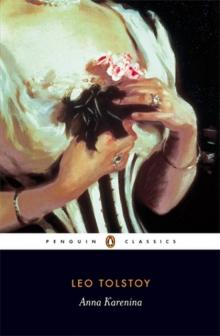 Anna Karenina
Anna Karenina Resurrection
Resurrection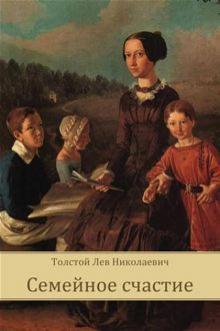 Family Happiness
Family Happiness War and Peace
War and Peace The Cossacks
The Cossacks The Kreutzer Sonata
The Kreutzer Sonata A Confession
A Confession The Kingdom of God Is Within You
The Kingdom of God Is Within You Father Sergius
Father Sergius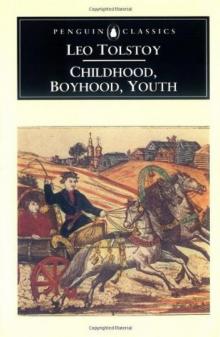 Childhood, Boyhood, Youth
Childhood, Boyhood, Youth Lives and Deaths
Lives and Deaths The Devil
The Devil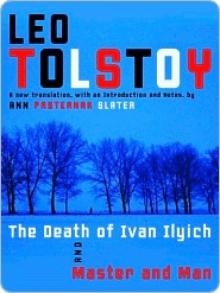 The Death of Ivan Ilyich and Master and Man
The Death of Ivan Ilyich and Master and Man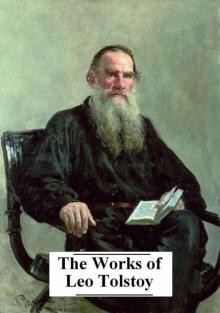 The Complete Works of Leo Tolstoy (25+ Works with active table of contents)
The Complete Works of Leo Tolstoy (25+ Works with active table of contents)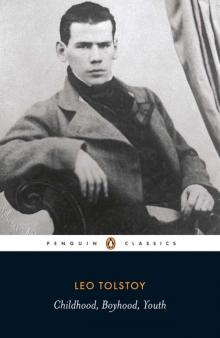 Childhood, Boyhood, Youth (Penguin ed.)
Childhood, Boyhood, Youth (Penguin ed.)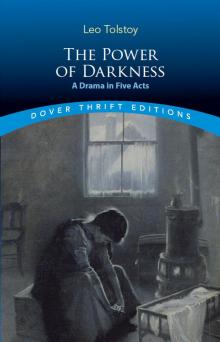 The Power of Darkness
The Power of Darkness Android Karenina
Android Karenina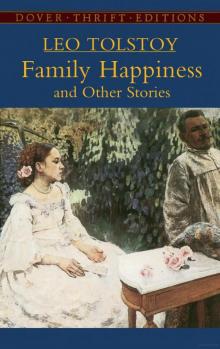 Family Happiness and Other Stories
Family Happiness and Other Stories The Lion and the Puppy
The Lion and the Puppy Collected Shorter Fiction, Volume 2
Collected Shorter Fiction, Volume 2 Collected Shorter Fiction, Volume 1
Collected Shorter Fiction, Volume 1